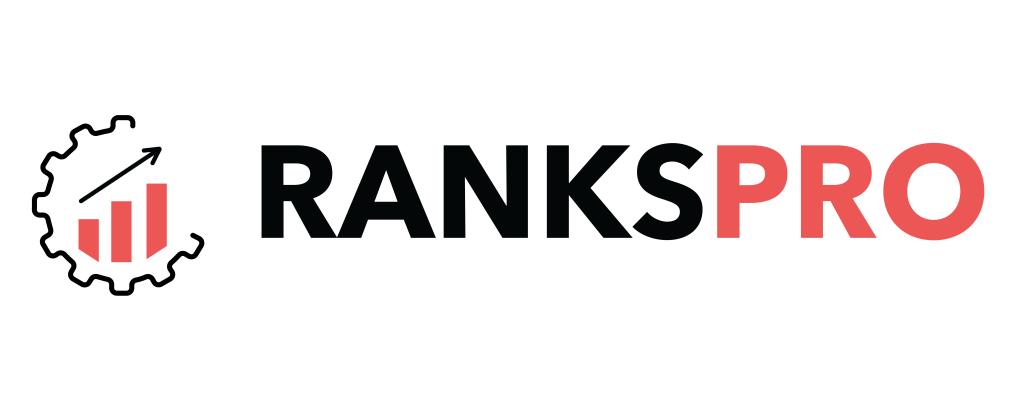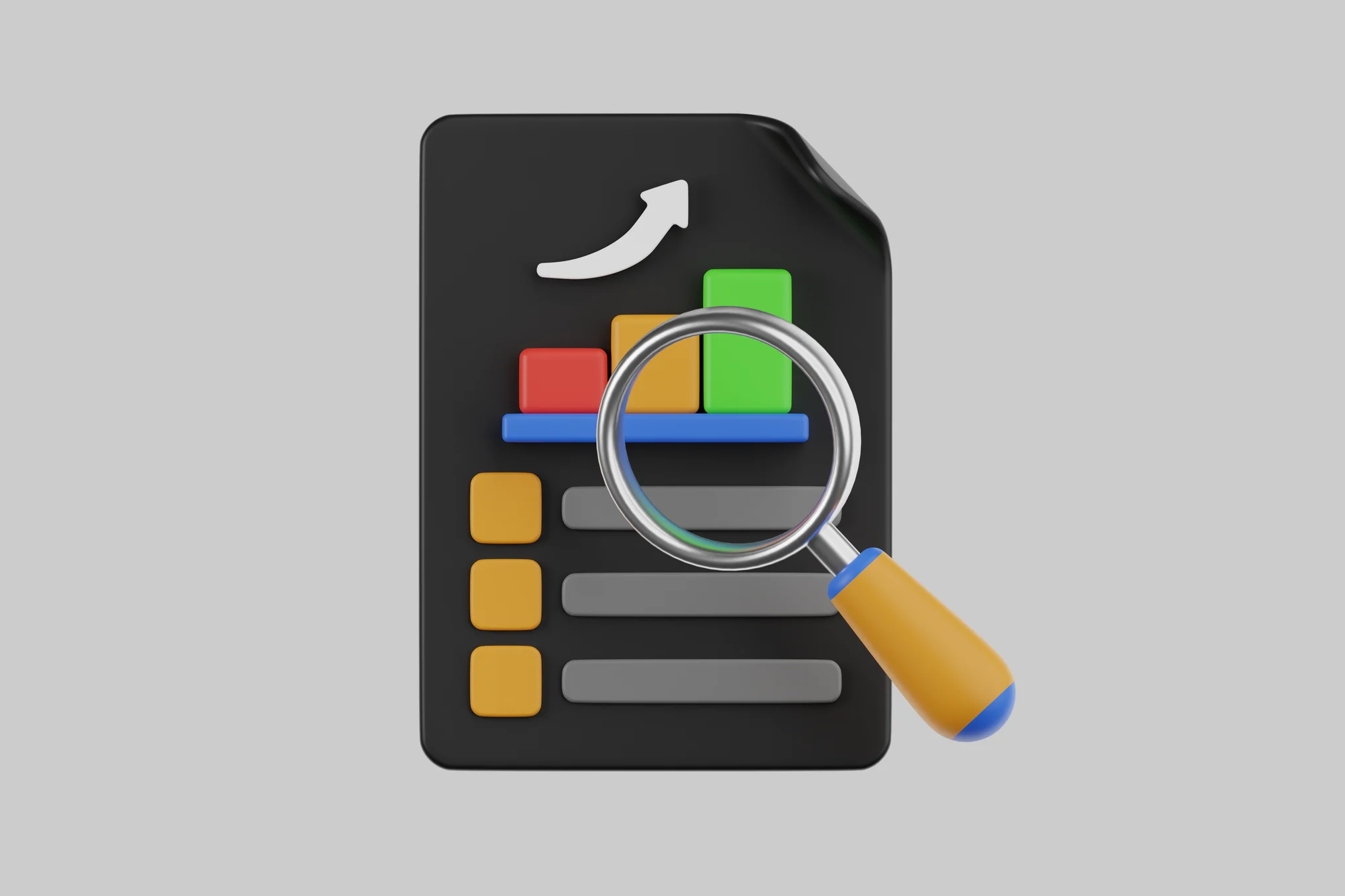As a digital marketer, content creator, or SEO specialist, you’re constantly on the hunt for effective keyword research tools to fuel your strategies.
While Ubersuggest offers a popular entry point with its user-friendly interface and freemium model, it’s essential to explore alternatives that might better suit your specific needs, budget, or advanced requirements.
The SEO landscape is dynamic, and different tools offer unique strengths in data depth, features, and overall approach.
This comprehensive guide will delve into 10 top-notch Ubersuggest alternatives, providing a detailed breakdown of their capabilities, pros and cons, and pricing to help you make an informed decision for your SEO endeavors in 2025 and beyond.
1. RanksPro
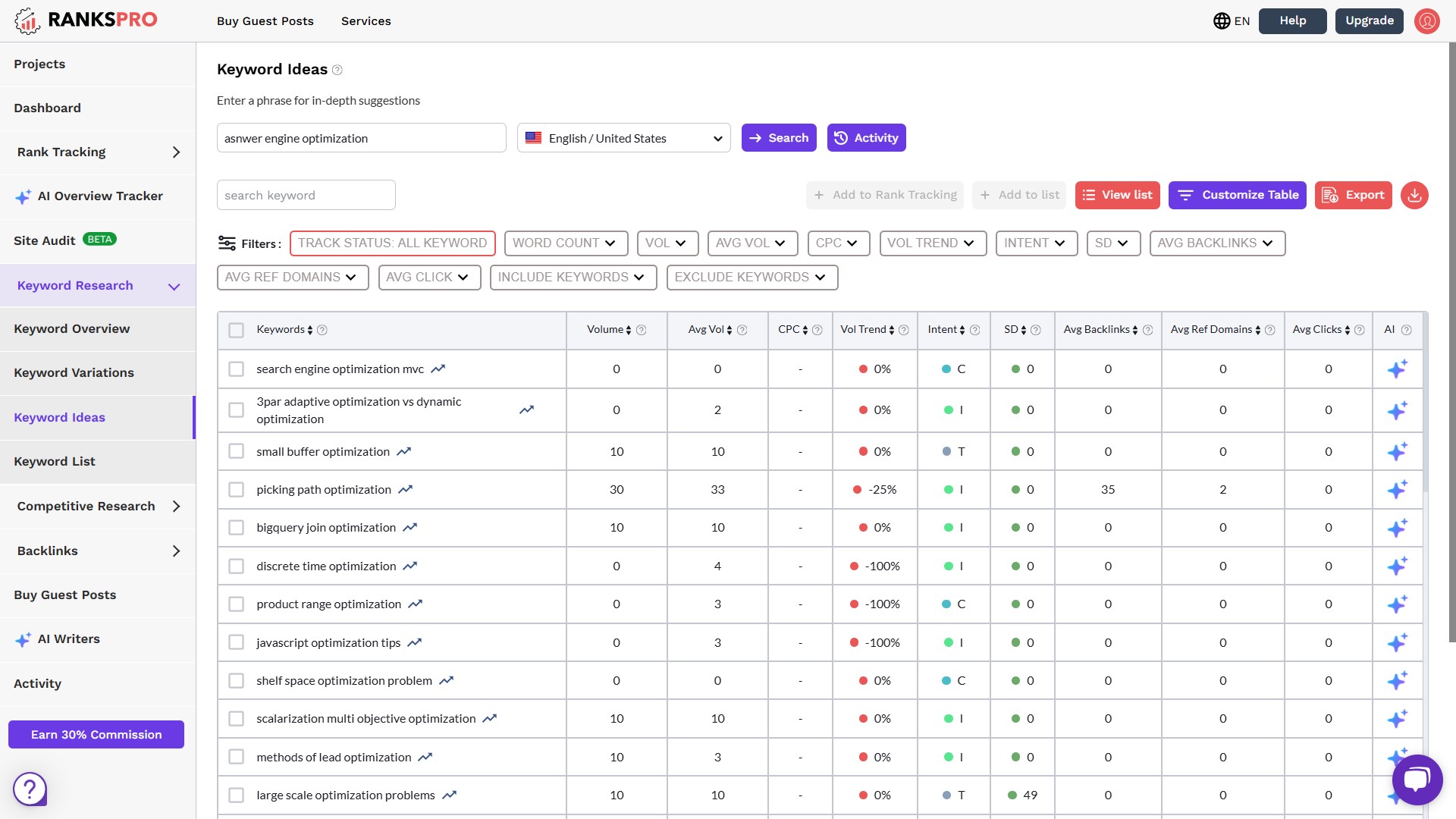
RanksPro offers a user-friendly, cloud-based SEO toolkit designed to provide multiple tools, including a keyword research tool. Trusted by over 10,000 professionals, its keyword research functionality provides essential metrics—like search volume, CPC, keyword difficulty, and intent insights—helping you quickly identify high-opportunity terms for content and SEO strategy
Top Keyword Research Features:
- Real-Time Search Volume & CPC Data: Instantly access monthly search volumes and cost-per-click values to assess keyword potential for both organic and paid campaigns.
- Keyword Difficulty Score: Evaluate competitiveness with an intuitive difficulty metric that helps you identify low-hanging keywords suited to your domain strength.
- Search Intent Classification: Gain insight into the underlying user intent—whether informational, transactional, or navigational—to better align your content strategy.
- Location-Based Filtering: Refine keyword data by country and language to support geo-targeted SEO campaigns with precision.
- Related Keywords & Suggestions: Expand your strategy with suggestions for long-tail and semantically related keywords that boost topical reach.
Pros:
- All-in-one SEO integration
- User-friendly dashboard with intuitive navigation
- Search Intent support that enhances keyword strategy relevance
- Affordable for small businesses and startups
- Multi-location tracking across 150+ countries
Cons:
- Upgrading with new AI-based features so users need to stay updated.
- A slight learning curve for beginners
Pricing: Paid plans start from $19 per month, while there is also a free plan for 1 domain, up to 10 tracked keywords, crawling for 10 pages, and base keyword research credits. There is a 7-day free trial available.
2. Mangools (KWFinder)
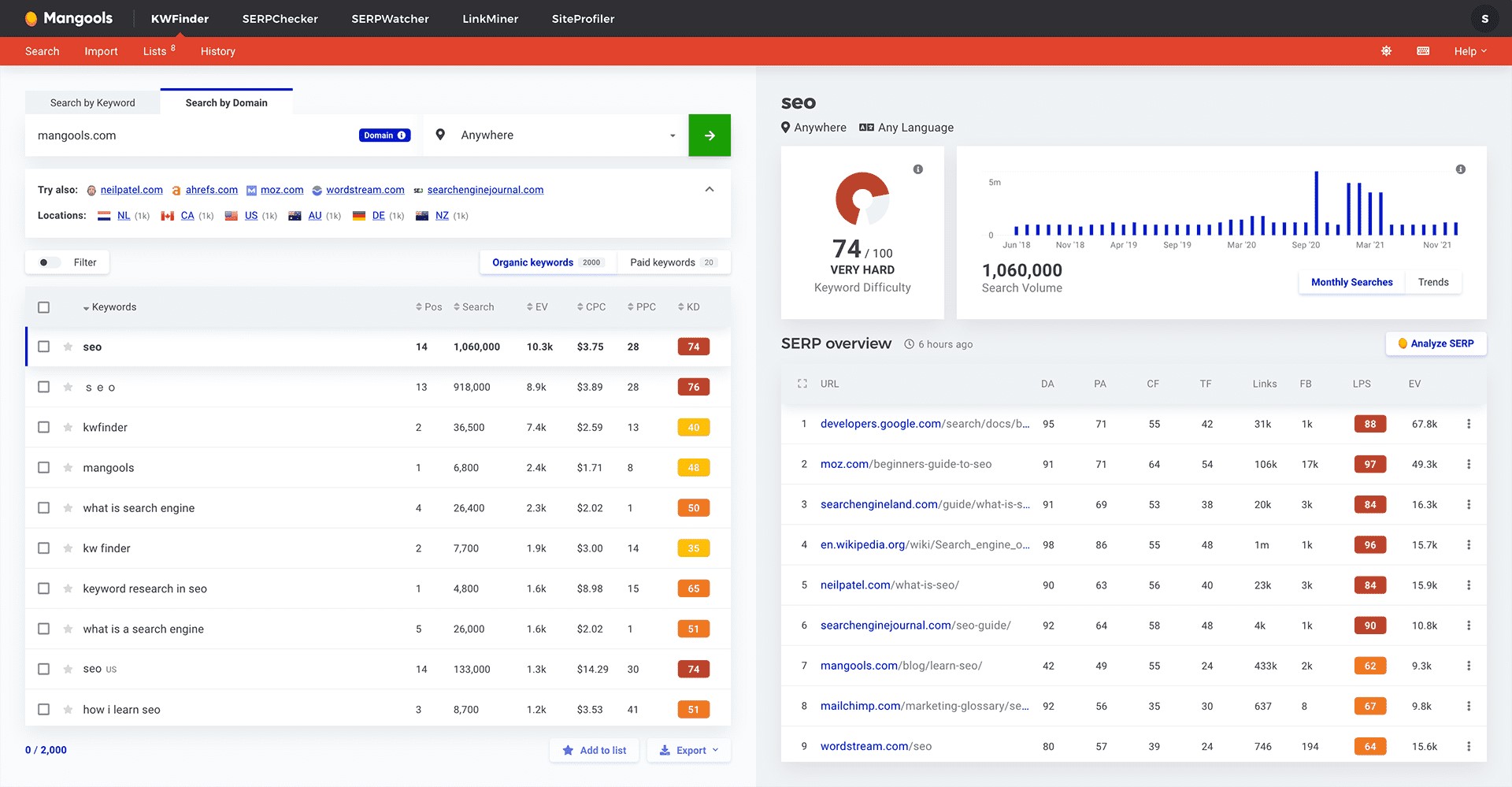
Mangools is a suite of five user-friendly SEO tools, with KWFinder being its flagship for keyword research. It’s particularly popular among bloggers, niche site builders, and small businesses due to its intuitive interface and affordable pricing.
Top Features:
- KWFinder: This core tool helps you find long-tail keywords with low SEO difficulty, making it ideal for targeting less competitive terms and gaining quick wins. It provides exact search volumes, keyword trends, and difficulty scores.
- SERPChecker: Analyze the search engine results pages (SERPs) for any keyword, allowing you to see the SEO metrics of top-ranking competitors and identify opportunities to outrank them.
- SERPWatcher: Track your keyword rankings and monitor your progress in the SERPs over time. This helps you understand the impact of your SEO efforts and adjust your strategy as needed.
- LinkMiner: While not as comprehensive as other Ahrefs alternatives, LinkMiner provides basic backlink analysis, helping you identify potential link-building opportunities for your target keywords.
- SiteProfiler: Get a quick overview of a website’s authority, traffic, and top content, which can be useful for competitive analysis and identifying popular topics in your niche.
Pros:
- Extremely user-friendly and intuitive interface.
- Affordable pricing, especially for the features offered.
- Excellent for finding long-tail keywords with low competition.
- Provides useful visual data and trends.
- Offers a suite of five integrated SEO tools.
Cons:
- Smaller keyword database compared to premium tools like Semrush and Ahrefs.
- Backlink analysis is basic compared to dedicated backlink tools.
- Limited advanced features for enterprise-level SEO.
Pricing: Mangools offers very budget-friendly plans starting from $24.50 per month.
3. AnswerThePublic

AnswerThePublic is a unique keyword research tool that visualizes search queries and questions around a given topic. It pulls data from Google’s autocomplete and other sources to present a “search cloud” of questions, prepositions, comparisons, and alphabetical searches.
Top Features:
- Question Keywords: Generates a comprehensive list of questions (Who, What, When, Where, Why, How, Which, Are, Is, Can) related to your seed keyword, directly revealing user queries.
- Preposition Keywords: Shows keyword ideas linked by prepositions like “for,” “with,” “to,” “without,” helping you uncover specific needs and relationships people search for.
- Comparison Keywords: Displays keywords involving comparisons such as “vs,” “and,” “or,” which are excellent for crafting comparison articles or product reviews.
- Alphabetical & Related Keywords: Provides keyword variations organized alphabetically and a list of broader related terms, expanding your content possibilities.
- Visualizations: Present data in intuitive, colorful visualizations that are easy to understand and share, making brainstorming sessions more effective.
Pros:
- Excellent for understanding user intent and generating content ideas based on real questions.
- Unique visual presentation of keyword data.
- Great for long-tail keyword discovery.
- User-friendly and intuitive.
- Offers a free tier for limited searches.
Cons:
- Lacks in-depth metrics like search volume, keyword difficulty, or CPC (though it integrates with Ubersuggest for these).
- Not a comprehensive all-in-one SEO tool.
- Limited number of free searches per day.
Pricing: AnswerThePublic offers a free plan with limited daily searches. Paid plans start from around $99/month for individual users, with custom plans for teams and agencies.
4. Semrush
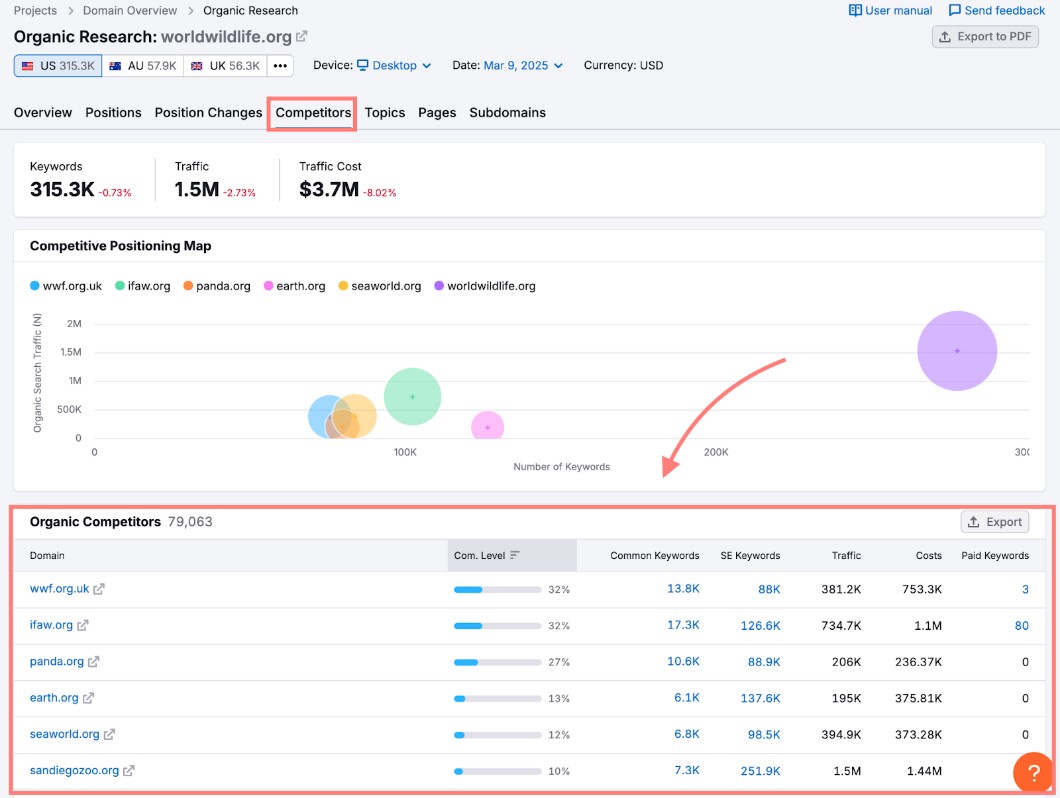
Semrush is an industry-leading all-in-one SEO and digital marketing platform, far more extensive than just a keyword research tool. It offers a vast suite of functionalities catering to everything from SEO and PPC to content marketing, social media management, and competitive intelligence.
Top Features:
- Extensive Keyword Database: Semrush offers a massive array of keyword ideas, including long-tail variations, related keywords, and question-based queries. This allows for deep exploration of any niche.
- Keyword Magic Tool: Generate millions of keyword ideas from a single seed keyword, categorize them by topic, and apply various filters like search volume, keyword difficulty, intent, and SERP features.
- Keyword Gap Analysis: Compare your keyword rankings with those of your competitors, identifying keywords they rank for that you don’t.
- Organic Research: Gain in-depth insights into any website’s organic search performance, including its top-performing keywords, traffic trends, and competitor analysis.
- Content Marketing Toolkit: Beyond keyword research, Semrush integrates tools for content creation, optimization, and auditing, helping you craft SEO-friendly content that ranks.
Pros:
- Comprehensive all-in-one platform for various marketing needs.
- Massive and highly accurate keyword database.
- Excellent competitive analysis features.
- Regularly updated with new features and data.
- Strong community and extensive learning resources.
Cons:
- Can be overwhelming for beginners due to the sheer number of features.
- Higher price point compared to Ubersuggest and some other alternatives.
- Steeper learning curve required to utilize its full potential.
Pricing: Semrush offers several pricing plans starting from $129.95/month, again quite expensive for keyword research and analysis purposes. And hence, sometimes users also find Semrush alternatives to avoid peak charges.
5. Ahrefs
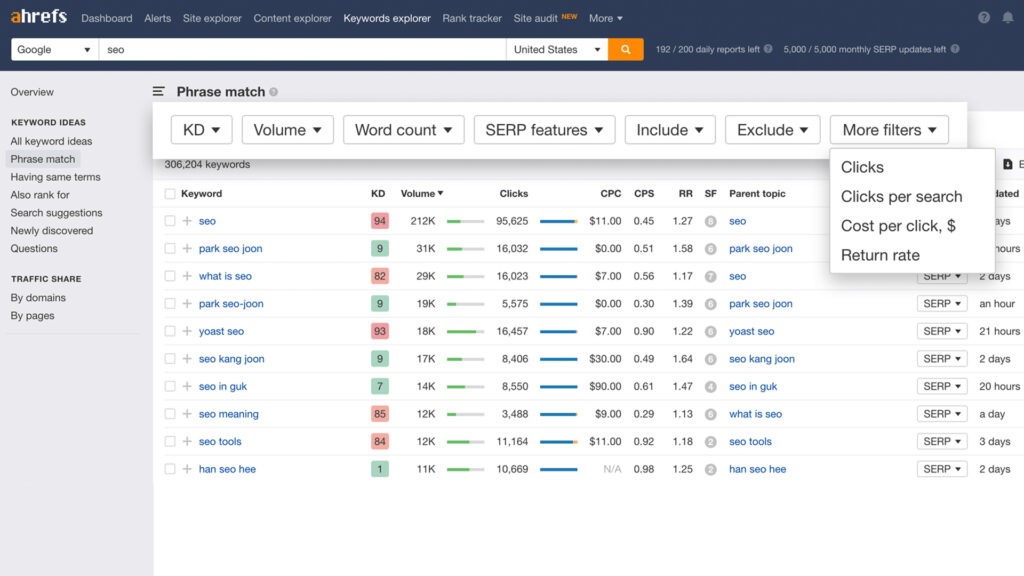
Ahrefs is another industry giant, particularly renowned for its unparalleled backlink analysis capabilities. However, its Keyword Explorer tool is equally impressive, offering extensive data for keyword research, competitive analysis, and content strategy.
Top Features:
- Keyword Explorer: Ahrefs’ Keyword Explorer provides a vast array of keyword ideas, global and local search volumes, keyword difficulty scores, and advanced SEO metrics like return rate and clicks per search.
- Parent Topic: Helps you understand the overarching topic behind a specific keyword, allowing you to create comprehensive content that addresses user intent broadly.
- Content Gap: Identifies keywords your competitors rank for but you don’t, providing actionable insights for new content opportunities.
- Site Explorer: This powerful tool allows you to analyze any website’s organic search traffic, backlink profile, and top-performing pages.
- SERP Overview: For any given keyword, Ahrefs provides a detailed SERP overview, showing the top-ranking pages, their key SEO metrics, and an estimation of their traffic.
Pros:
- Industry-leading backlink analysis.
- Massive and accurate keyword database.
- User-friendly interface despite its advanced features.
- Excellent for competitive research and content gap analysis.
- Strong focus on practical SEO insights.
Cons:
- Higher price point, similar to Semrush.
- No integrated content writing or on-page optimization features like some alternatives.
- The learning curve can be steep for absolute beginners due to the depth of data.
Pricing: Ahrefs is also on the expensive side, offering paid plans from $129 per month.
6. Moz Keyword Explorer
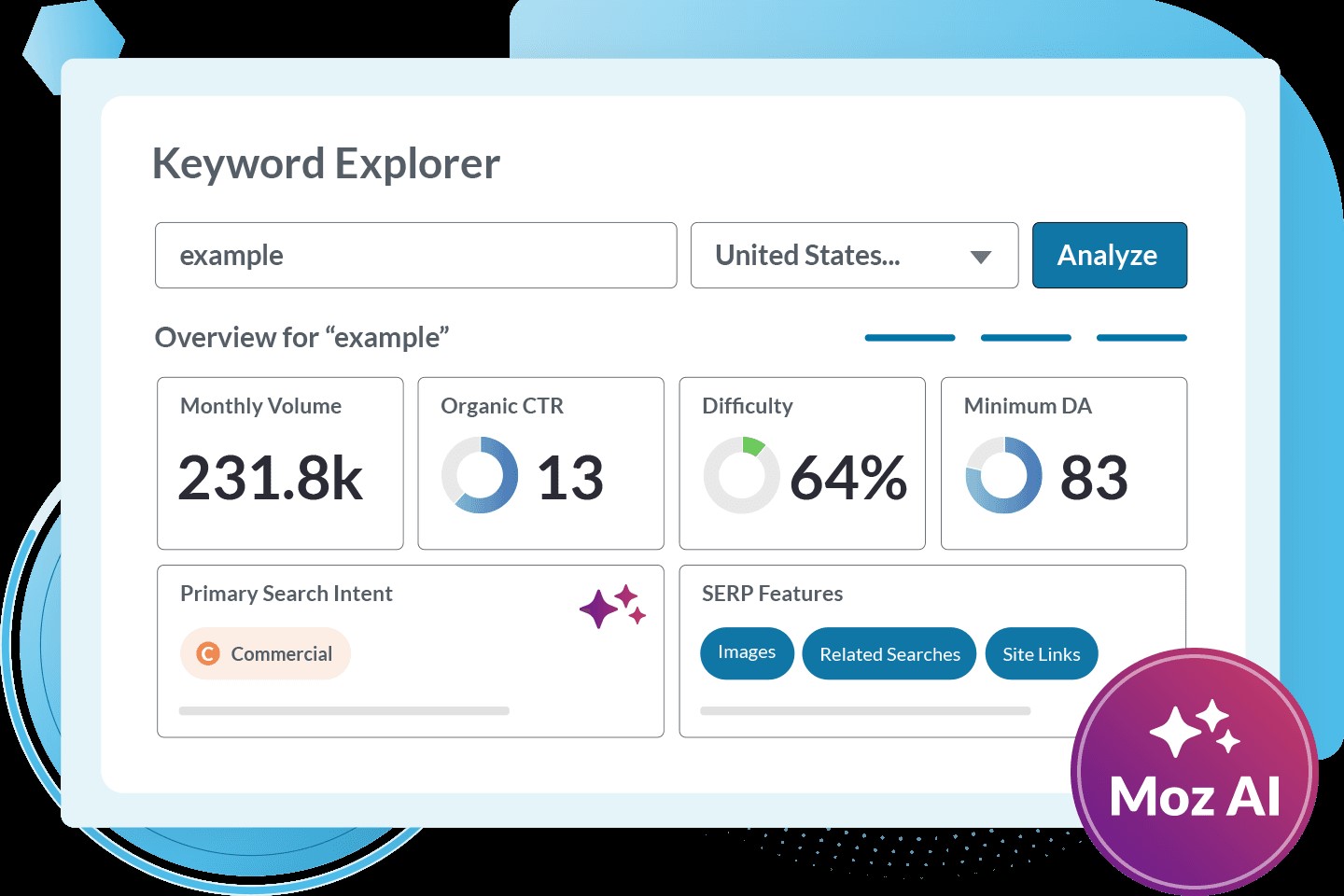
Moz Pro is a comprehensive SEO suite, and its Keyword Explorer is a standout feature, particularly known for its focus on providing a holistic view of keyword opportunities. Moz aims to simplify complex SEO data into actionable insights, making it a good choice for both beginners and experienced SEOs.
Top Features:
- Keyword Difficulty Score: Helps you assess how hard it will be to rank for a given keyword, considering the Domain Authority and Page Authority of competing pages.
- Opportunity Score: It estimates the potential traffic from a keyword if you were to rank for it, helping you prioritize keywords with the highest potential impact.
- Keyword Suggestions: Generates a wide range of keyword ideas, including related keywords, questions, and long-tail variations, helping you uncover untapped opportunities.
- SERP Analysis: Get detailed insights into the current search engine results page for any keyword, including the Moz metrics (Domain Authority, Page Authority) of ranking pages.
- Keyword Lists: Organize and save your keyword research into custom lists, allowing for easy tracking and prioritization of your target keywords across different projects or content clusters.
Pros:
- User-friendly interface, making it accessible for beginners.
- Strong focus on keyword difficulty and opportunity scores.
- Reliable Moz metrics (Domain Authority, Page Authority).
- Comprehensive suite of SEO tools beyond keyword research.
- Good learning resources and community support.
Cons:
- Smaller keyword database compared to Semrush or Ahrefs.
- Some advanced features might feel less granular than competitors.
- Can be a bit slower in data updates compared to other Moz alternatives.
Pricing: Moz Pro offers various plans from which the least expensive is $99/month (billed annually).
7. SE Ranking
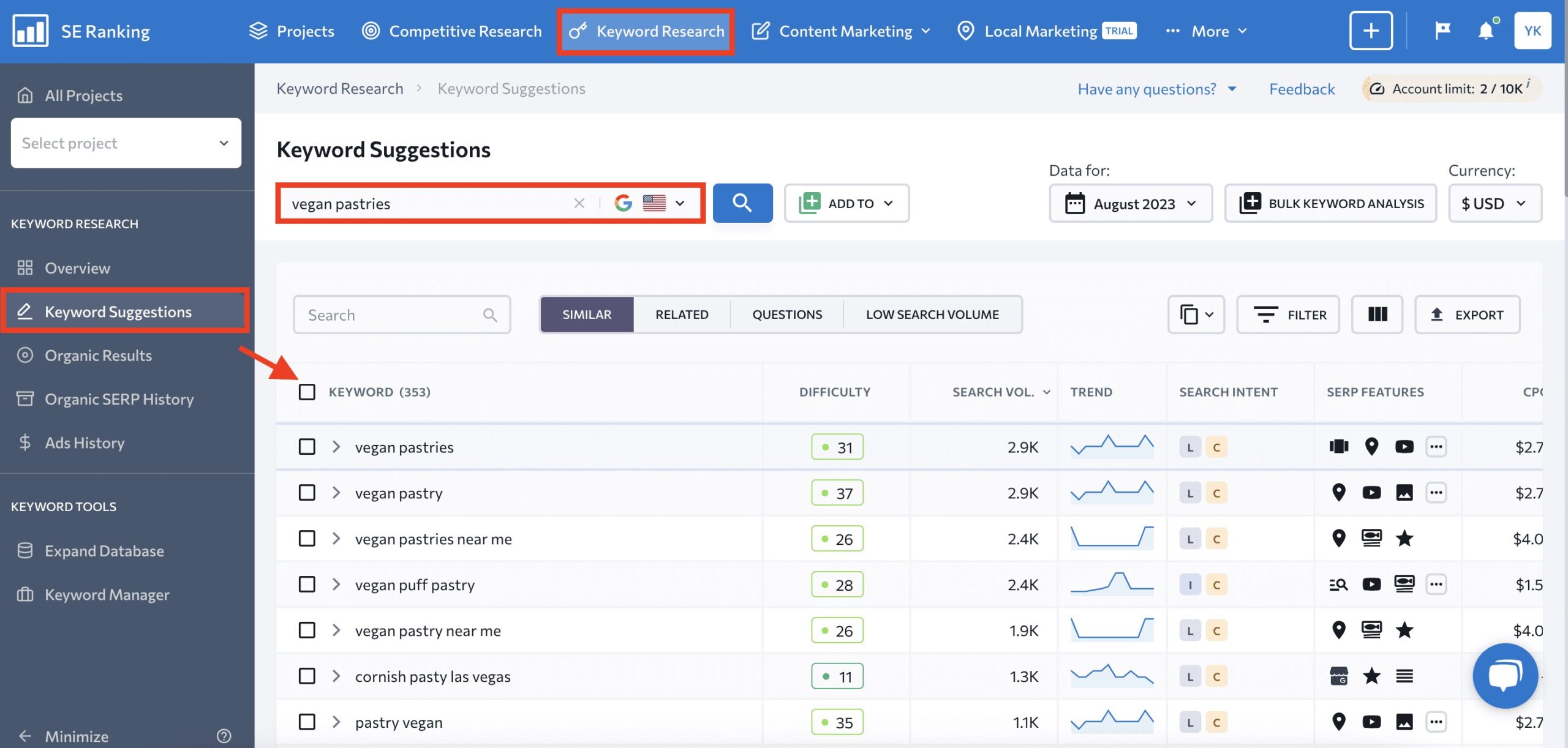
SE Ranking is an all-in-one SEO platform that has gained significant traction for its comprehensive features and flexible pricing. It offers a strong set of tools for keyword research, competitor analysis, rank tracking, website auditing, and more, positioning itself as a robust and scalable Ubersuggest alternative.
Top Features:
- Keyword Research Tool: SE Ranking’s keyword research tool provides an extensive list of keyword ideas, including long-tail variations, related keywords, and questions.
- Competitive Research: Analyze your competitors’ organic and paid keywords, traffic, and backlink profiles.
- Keyword Grouper: This tool automatically organizes your keywords into logical groups, making it easier to plan content clusters and develop a cohesive SEO strategy.
- Rank Tracker: Monitor your keyword positions across various search engines and locations, providing historical data and competitor comparisons to track your SEO performance.
- Website Audit: Identify technical SEO issues on your website that might be hindering your rankings, ensuring your site is optimized for search engines and user experience.
Pros:
- Comprehensive all-in-one SEO platform.
- Flexible pricing model based on keyword tracking needs.
- User-friendly interface with good data visualization.
- Strong rank tracking and competitive analysis features.
- Offers white-label reports for agencies.
Cons:
- Data accuracy for some metrics might be slightly less precise than top-tier tools.
- Still developing in certain areas compared to more established platforms.
- Can feel less specialized in keyword research than KWFinder.
Pricing: SE Ranking’s pricing is flexible and depends on the frequency of rank checking and the number of keywords tracked. Plans start from around $23.40/month, along with a 14-day free trial.
8. SpyFu

SpyFu specializes in competitive intelligence, allowing you to “spy” on your competitors’ most profitable keywords and ad copy. While it excels in competitive analysis, its keyword research features are robust enough to provide valuable insights for your campaigns.
Top Features:
- Keyword Research: Discover keywords that your competitors are ranking for organically and through paid ads, accessing data on search volume, CPC, and estimated monthly clicks.
- Competitor Keyword Analysis: Get a detailed report on every keyword they rank for, their ad history, and how much they spend on PPC.
- Shared Keywords: Identify keywords that you and your competitors both rank for, helping you pinpoint areas where you need to strengthen your content or refine your targeting.
- Keyword History: See the historical performance of keywords, including changes in search volume and competition over time, for identifying trends and evergreen opportunities.
- Related Keywords: SpyFu generates a list of related keywords based on your initial search, helping you expand your keyword universe and discover new content ideas.
Pros:
- Exceptional for competitive analysis, particularly for PPC.
- Provides historical data on keyword performance and ad campaigns.
- Helps uncover competitors’ most profitable keywords.
- Relatively easy-to-use interface for quick insights.
Cons:
- Less focused on broad keyword discovery compared to other tools.
- Data might be more geared towards paid search than organic SEO for some metrics.
- The user interface can sometimes feel a bit dated.
Pricing: SpyFu’s paid plans is on the less expensive side, starting from $39/month (billed annually).
9. Serpstat
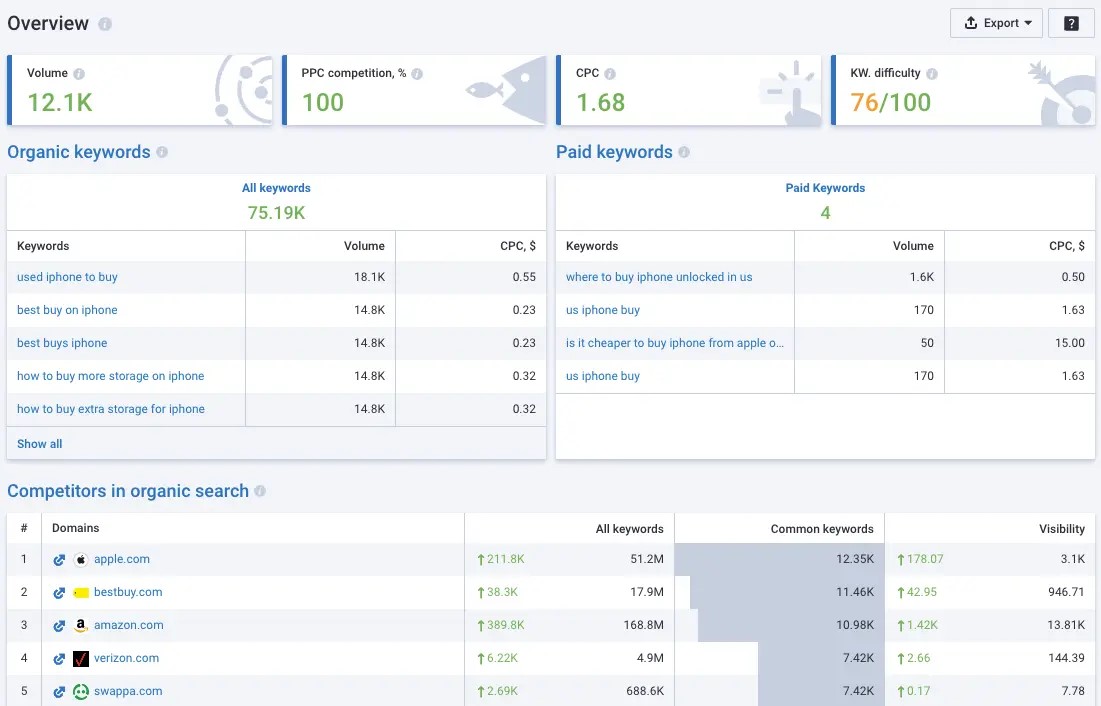
Serpstat is an all-in-one SEO platform that originated as a keyword research tool and has since expanded to offer a full suite of features for SEO, PPC, and content marketing. It’s often praised for its detailed keyword analysis and competitive intelligence, offering a comprehensive alternative to Ubersuggest.
Top Features:
- Keyword Research: Provides an extensive keyword database with metrics like search volume, keyword difficulty, CPC, and competition level.
- Competitor Analysis: Gain insights into your competitors’ organic and paid keywords, top pages, and traffic estimations.
- Missing Keywords: This valuable feature helps you discover keywords that your competitors rank for but you don’t, providing actionable opportunities to expand your content strategy.
- Search Questions: Identify common questions related to your keywords, which is excellent for generating content ideas to address user intent.
- Batch Analysis: Analyze multiple keywords or domains simultaneously, saving time and providing quick comparisons for large-scale research projects.
Pros:
- Comprehensive all-in-one SEO platform.
- Strong focus on keyword research and competitive analysis.
- Affordable pricing for the breadth of features.
- Good for identifying missing keywords and search questions.
- Offers an API for advanced users.
Cons:
- User interface can be a bit overwhelming for new users.
- Data depth might not always match the top-tier tools like Semrush or Ahrefs.
- Some users report occasional data refresh delays.
Pricing: Serpstat pricing plan starts from $50 per month with a 7-day trial period.
10. Surfer SEO

Surfer SEO is a cloud-based on-page optimization platform that blends keyword research with content structuring and AI-powered writing. Designed for marketers seeking fast, data-driven content creation, its Keyword Research module offers search volume, keyword difficulty, and topical clustering.
Top Features:
- Keyword Volume & Difficulty Metrics: Displays precise monthly search volume and difficulty scores, helping you identify viable topics worth targeting.
- Topical Maps & Keyword Clustering: Automatically groups related queries into keyword clusters or content hubs—simplifying strategy and internal linking.
- SERP Analyzer Integration: Combines keyword research with real-time SERP analysis to reveal what top-ranking pages include, such as word counts, headings, and n-grams.
- Location-Based Targeting: Offers country-level targeting for keyword research, ideal for both global campaigns and region-specific content strategies.
- Autocomplete Keyword Suggestions: Generates long-tail phrases and related terms using autocomplete data, expanding your keyword lists effortlessly.
Pros:
- Provides a holistic SEO workflow.
- SERP integration gives real-time data on competitors.
- Simplified dashboards eliminate steep learning curves.
- Works alongside Surfer’s AI tools to accelerate article creation.
Cons:
- Smaller data sets compared to heavyweights like SEMrush or Ahrefs.
- Risk of over-optimization.
- Separate add-ons required.
Pricing: The Google Chrome extension for Keyword Surfer is free; however, for more functionalities, the basic plan starts from $79 per month.
Conclusion: Choose the Right Keyword Tool for Your Strategy
Keyword research is the cornerstone of every successful SEO and content marketing strategy. While Ubersuggest is a solid choice for many, it’s not always the perfect fit, especially when your needs expand in terms of data accuracy, competitive analysis, or content planning.
Fortunately, there are several powerful alternatives available. Tools like RanksPro, Surfer SEO, SEMrush, Ahrefs, and Moz offer enterprise-level insights, while platforms such as AnswerThePublic, SpyFu, and Serpstat cater to budget-conscious marketers with highly specific use cases.
Whether you’re an SEO agency, content creator, eCommerce business, or digital strategist, there’s a tool on this list tailored for your workflow and budget.
Don’t just go for the most popular option—evaluate each tool based on features, pricing, and your specific goals. Test a few with free trials, explore their keyword clustering, search intent mapping, and SERP insights, and see which one best complements your long-term growth.
In the evolving world of AI-driven search and content, having a reliable keyword research tool can be the competitive edge you need to outrank the competition intelligently and efficiently.
